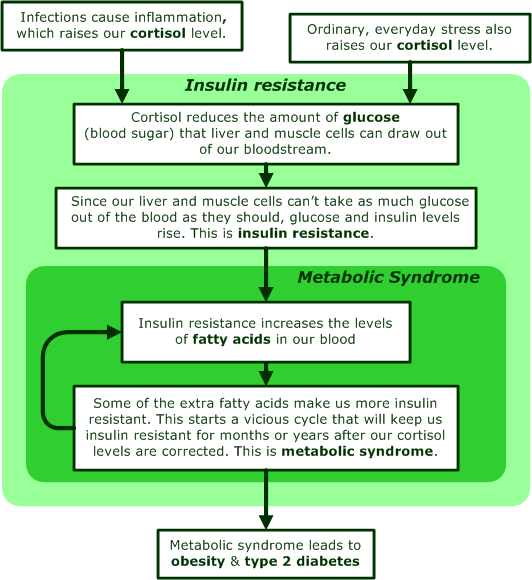Metabolic syndrome
If you are obese or have type 2 diabetes, you probably have a disorder called metabolic syndrome. The central feature of metabolic syndrome is insulin resistance, and cortisol is a major cause of insulin resistance.
Cortisol is often called a "counterregulatory" hormone because it resists the actions of the "regulatory" hormone insulin. Any increase in cortisol causes a corresponding increase in insulin resistance. The drawing shows how chronic infections and stress lead to insulin resistance and metabolic syndrome.

When cortisol levels are high, our cells burn less sugar and more fat. This sounds like a good thing, and it is a good thing in emergencies. Unfortunately, the extra cortisol and fat "poison" our liver, muscle, and heart cells in such a way that they will remain insulin resistant even when cortisol levels return to normal. This state of persistent insulin resistance is usually called metabolic syndrome, although some experts call it Syndrome X or prediabetes.
Metabolic syndrome begins years before obesity appears; millions of people who are not obese have metabolic syndrome, while nearly everyone who is obese or diabetic has metabolic syndrome.
Several of the drugs used to treat type 2 diabetes work by reducing the effects of metabolic syndrome.
Syndrome X and Obesity
In 2000, Gerald Reaven, M.D., published a book entitled Syndrome X: Overcoming The Silent Killer That Can Give You A Heart Attack. The book introduced most of the world to the concept of insulin resistance. Dr. Reaven brought together information that had been accumulating for sixty years and tied it together in a very readable book.
Syndrome X is almost universally called metabolic syndrome now, but they are not identical. Dr. Reaven intentionally omitted obesity from his definition of Syndrome X because obesity follows Syndrome X. Definitions of metabolic syndrome usually include obesity and elements of Reaven's Syndrome X. This has obscured the fact that insulin resistance and early metabolic syndrome precede the development of obesity.
If you are a medical professional, you should be clear on the differences between Syndrome X and metabolic syndrome. There is a table comparing definitions of Syndrome X and metabolic syndrome on page 170 of The Potbelly Syndrome. As Myamoto Musashi says in The Book of Five Rings: "This requires much study!"
More information on metabolic syndrome
For more information on how infections cause insulin resistance, metabolic syndrome, and type 2 diabetes, see Chapters 8, 13, and 16 of The Potbelly Syndrome.
PubMed lists 24,000+ studies of metabolic syndrome at: www.pubmed.gov. Most of them less than ten years old. A few of them are listed below.
Kim CH, Younossi ZM. Nonalcoholic fatty liver disease: a manifestation of the metabolic syndrome. Cleve Clin J Med. 2008 Oct;75(10):721-8.
Longo-Mbenza B, Nkondi Nsenga J, Vangu Ngoma D. Prevention of the metabolic syndrome insulin resistance and the atherosclerotic diseases in Africans infected by Helicobacter pylori infection and treated by antibiotics. Int J Cardiol. 2007 Mar 15; [Epub ahead of print]
Saibara T, Ono M, Onishi S. [NASH and metabolic syndrome] Nippon Rinsho. 2006 Jun;64(6):1165-7. Review. Japanese.
Romero-Gomez M. Insulin resistance and hepatitis C. World J Gastroenterol. 2006 Nov 28;12(44):7075-80.
Walker BR. Cortisol--cause and cure for metabolic syndrome? Diabet Med. 2006 Dec;23(12):1281-8.
Kim HC, Choi SH, Shin HW, Cheong JY, Lee KW, Lee HC, Huh KB, Kim DJ. Severity of ultrasonographic liver steatosis and metabolic syndrome in Korean men and women. World J Gastroenterol. 2005 Sep 14;11(34):5314-21.
Wake DJ, Walker BR. 11 beta-hydroxysteroid dehydrogenase type 1 in obesity and the metabolic syndrome. Mol Cell Endocrinol. 2004 Feb 27;215(1-2):45-54. Review.
Andrews RC, Herlihy O, Livingstone DE, Andrew R, Walker BR. Abnormal cortisol metabolism and tissue sensitivity to cortisol in patients with glucose intolerance. J Clin Endocrinol Metab. 2002 Dec;87(12):5587-93.
Andrew R, Gale CR, Walker BR, Seckl JR, Martyn CN. Glucocorticoid metabolism and the Metabolic Syndrome: associations in an elderly cohort. Exp Clin Endocrinol Diabetes. 2002 Sep;110(6):284-90.
Knobler H, Schattner A, Zhornicki T, Malnick SD, Keter D, Sokolovskaya N, Lurie Y, Bass DD. Fatty liver--an additional and treatable feature of the insulin resistance syndrome. QJM. 1999 Feb;92(2):73-9.
